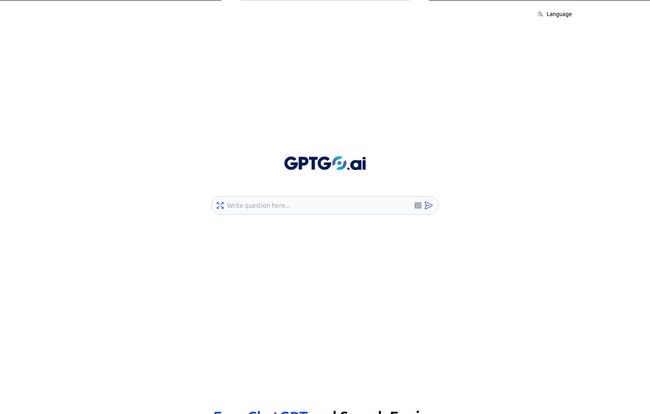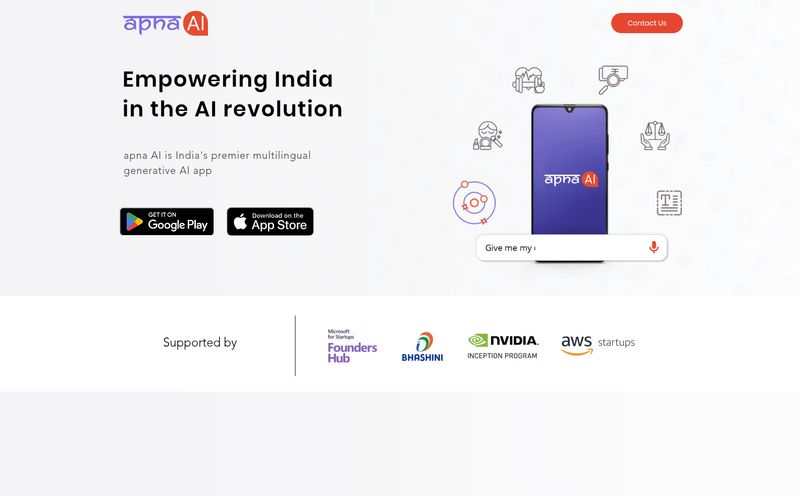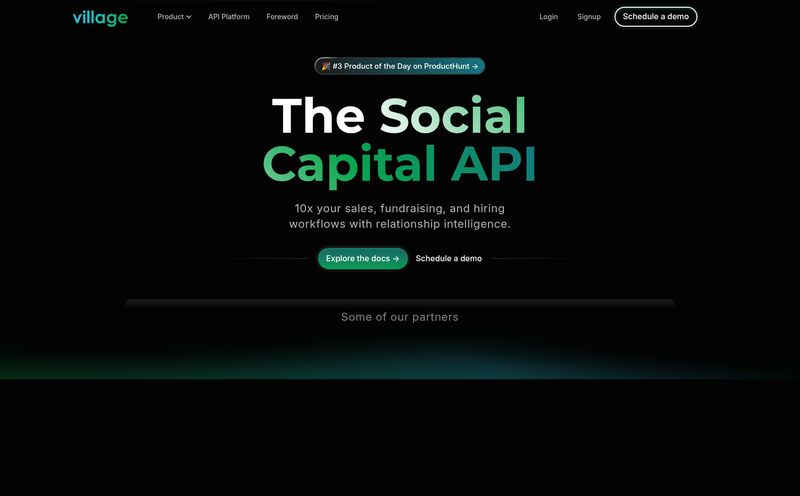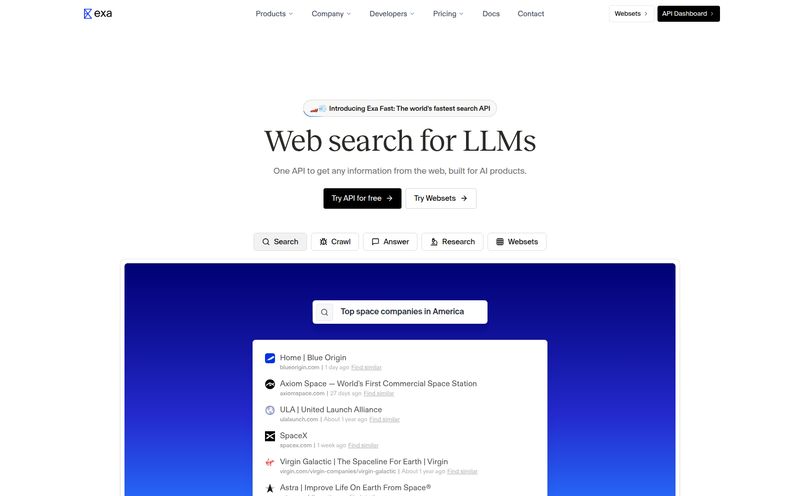I swear, some days I feel like I'm in a toxic relationship with Google. We’ve been together for decades, but lately, finding a straight answer feels like pulling teeth. I ask a simple question, and I get a first page flooded with ten thinly-veiled ads, a bunch of hyper-optimized articles that take 800 words to say nothing, and maybe, just maybe, a Quora thread from 2014 that's vaguely relevant.
It's exhausting. We're all in this content game, I get it. I write SEO content for a living! But sometimes you just want the answer, not the 12-paragraph backstory and a pop-up asking you to subscribe.
So when I stumble across a tool that promises to cut through the noise, my ears perk up. Lately, that's meant anything with '.ai' in the URL. Enter GPTGO.ai, a tool that's been making some quiet waves. Its promise is simple: blend the raw power of Google's search index with the conversational smarts of ChatGPT. For free. And without needing an account.
Sounds too good to be true, right? That’s what I thought. So I cleared my afternoon, poured a coffee, and took it for a proper spin.
So, What on Earth is GPTGO?
Let's break it down. At its core, GPTGO is a hybrid search engine. When you type in a query, it does two things at once:
- It runs a standard Google search and shows you those familiar blue links we all know and love (or tolerate).
- Simultaneously, it feeds your query to ChatGPT to generate a synthesized, conversational answer.
The result is a single page that gives you both a list of sources and a direct answer. It’s like having a research assistant who gives you a summary and their bibliography at the same time. The platform used to be called GooGPT, which, let's be honest, was probably a bit too close for comfort for Google's legal team. The rebrand to GPTGO makes sense.
First Impressions Are Everything
Landing on the GPTGO homepage is... refreshing. It's clean. Almost stark. There’s no clutter, no trending topics, no celebrity gossip. Just a logo, a search bar, and a promise. It’s a breath of fresh air in a world of increasingly busy and distracting interfaces.
You type your question, hit enter, and the magic happens. On the left, your AI-generated answer starts to form. On the right, the Google search results populate. It's incredibly straightforward.

Visit GPTGO
The Good, The Bad, and The AI-Generated Ugly
No tool is perfect, especially not a free one. After playing with it for a while, I’ve got a pretty good feel for its strengths and where it stumbles.
Why I'm Keeping it Bookmarked
The biggest pro is right there in the name: free access to ChatGPT functionality. And not just any access—the site claims it uses a premium account, which means you're supposedly getting a higher-quality response without paying OpenAI's subscription fee. For the casual user, that's a massive win.
I also love, and I mean love, that there's no signup required. I didn't have to give it my email, connect a Google account, or promise it my first-born child. I just went to the site and used it. This low barrier to entry is fantastic. In an age of data harvesting and endless subscriptions, this feels almost rebellious.
The dual-view of AI summary plus search results is also more useful than I initially thought. It helps you fact-check the AI's response in real-time. If the ChatGPT answer says something that sounds a bit off, the sources are right there for you to check. It's a built-in B.S. detector.
Where It Gets a Little Shaky
Now, for the reality check. The tool isn't instantaneous. There's a noticeable lag while the ChatGPT answer generates. It's not painfully slow, but if you're used to Google's sub-second results, you'll feel the difference. A small price to pay for a free, custom-written summary, in my opinion.
The bigger issue is accuracy. And this isn't really a GPTGO problem as much as it's an AI problem in general. The platform's accuracy is entirely dependent on two things: the quality of Google's search results and the current state of the ChatGPT API. We've all seen AI hallucinate—confidently stating things that are just plain wrong. Because GPTGO pulls from existing search data, it's less prone to complete fantasy, but it can still misinterpret nuance or pull from a less-than-reliable source. Always treat the AI answer as a starting point, not the gospel truth.
How Does GPTGO Stack Up Against the Competition?
The AI search space is getting crowded. You've got Perplexity AI, which is probably the most well-known competitor, and Google is frantically rolling out its own Search Generative Experience (SGE). So where does GPTGO fit?
I'd describe it as a lightweight contender. Perplexity is more of a feature-rich research tool, allowing you to refine searches, focus on specific sources like academic papers or YouTube, and manage your search threads. It's powerful, but it can also be a bit much if you just want a quick answer.
GPTGO is the opposite. It’s stripped-down and focused. It does one thing—combining a search with a chat response—and does it simply. It’s less of a heavyweight research platform and more of a nimble, everyday utility. It's for when you want more than a Google result but less than a full-blown research project.
| Feature | GPTGO | Perplexity AI |
| Cost | Completely Free | Freemium (with a Pro subscription) |
| Account Needed | No | Optional (but needed for history/Pro) |
| Core Function | Google results + one ChatGPT answer | Conversational search with citations and follow-up questions |
| Best For | Quick, summarized answers to everyday questions | In-depth research and source analysis |
Who is This Really For?
After using it, I can see a few groups of people really benefiting from GPTGO:
- Students: For getting a quick overview of a topic before diving into a research paper. It can help formulate a thesis or find initial sources.
- Content Creators & Marketers: Perfect for brainstorming blog post ideas or getting a quick summary of a trend. I used it to research this very article.
- The Casually Curious: Anyone who is tired of sifting through SEO spam to find out the best way to prune a tomato plant or the history of a weird meme. It just gets you closer to the answer, faster.
It's not going to replace deep research or a professional consultation, obviously. But for a huge chunk of our daily searches? Yeah, it's pretty darn useful.
Frequently Asked Questions About GPTGO
I noticed a few common questions on their site and have a few of my own, so let's tackle them.
How is GPTGO different from a regular Google search?
A regular search just gives you a list of links you have to visit yourself. GPTGO does that, but also gives you a direct, written-out answer created by AI, summarizing information from those links so you dont have to click on every one.
Do I need my own ChatGPT account to use it?
Nope. Not at all. GPTGO provides the connection to ChatGPT for you, completely free and without any login.
Is GPTGO really free to use?
Yes, it is 100% free. There are no hidden fees or subscription plans. It's a free-to-use website.
How accurate are the chatbot answers?
They are generally quite accurate for factual questions, as they are based on Google's top search results. However, like any AI, it can make mistakes or misinterpret things. Always use it as a guide, not a definitive source.
What devices can I use GPTGO on?
Any device with a web browser. It works just fine on my PC, my Android phone, and it should work on iPhones and tablets too. It’s a website, not an app.
Is there a GPTGO app for Android or iOS?
Based on their website, it seems they dont have a dedicated mobile app right now. You just access it through your phone's web browser.
My Final Verdict
So, is GPTGO.ai a game-changer? A true "Google killer"? Nah, let's not get carried away. Google's empire is safe for now.
But is it a genuinely useful and innovative tool that I will absolutely be using again? Yes. It has found a permanent spot in my browser's bookmarks bar. It represents a smart evolution of search, blending the familiar with the futuristic.
For those moments when you just want a straight answer without the digital runaround, GPTGO delivers. It’s fast (enough), free, and respects your privacy by not demanding a signup. In the current digital climate, that’s a combination that's hard to beat.
Reference and Sources
- GPTGO Official Website: https://www.gptgo.ai/
- Forbes Article on AI Hallucinations: https://www.forbes.com/sites/forbestechcouncil/2023/07/20/the-problem-of-ai-hallucinations/
- Perplexity AI: https://www.perplexity.ai/



